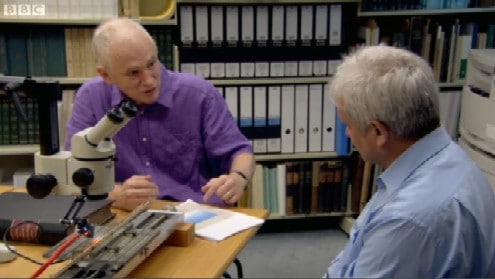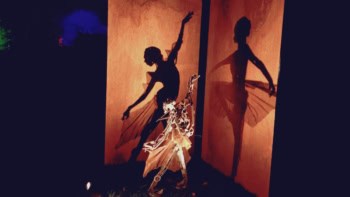
Climate researcher Phil Jones (left) discussing Climategate with Sir Paul Nurse
By James Dacey
At the end of November last year, the presidency of the UK’s Royal Society passed from cosmologist Martin Rees into the hands of the Nobel-prize-winning geneticist Sir Paul Nurse. Heading the world’s oldest scientific academy brings a responsibility to uphold the organization’s grand aim “to expand the frontiers of knowledge by championing the development and use of science, mathematics, engineering and medicine for the benefit of humanity and the good of the planet.”
And Nurse, it seems, is wasting no time in grabbing his presidency by the reigns. Last night he appeared on UK television presenting an episode of the long-standing documentary series Horizon, entitled “Science under attack”. The hour-long show explored the public’s relationship with science, as influenced by the media, and it focused primarily on climate science and the rise of public scepticism.
Towards the beginning of the show, Nurse cited a recent poll that found nearly half of people in the US, and more than a third of Britons, believe that manmade climate change is being exaggerated. “It’s this gap between scientists and the public that I want to understand,” proclaimed Nurse, teeing up the show.
For the next 50 minutes or so, Nurse then visited a selection of players on either side of the debate. It was framed within the narrative of a personal journey: an eminently reasonable scientist who knows lots about the process of science but not the specifics of climate science. And to his credit, Nurse played his part exceptionally well, showing that science involves personalities and conflicts just like any other human activity.
Naturally, the show came to focus on “Climategate”, the controversy that erupted in November when internal e-mails between members of the Climate Research Unit at the University of East Anglia, UK were leaked to the public. The main controversy blew up around an e-mail sent by the then CRU director Phil Jones to a colleague in which he referred to “Mike’s Nature trick”, describing the splicing of temperature data from direct and indirect sources.
“The [World Meteorological Organization] wanted a relatively simple diagram for their particular audience,” Jones explained to Nurse. When asked why he thought there had been such a huge reaction to the leaks, Jones is obviously still perplexed. “A number of the climate change sceptics or doubters or deniers, whatever you want to call them, just wanted to use these e-mails for their own purposes, to cast doubt on the basic science.”
Following his visit to UEA, Jones then paid a visit to a person firmly on the other side of the debate, James Delingpole, the online journalist who broke the “Climategate” story on his Telegraph blog. This led to the most captivating scene of the documentary when Nurse puts it to Delingpole that denying climate change is like ignoring the consensus medical view when choosing how to treat cancer.
Asking Nurse to change the topic, Delingpole retorts, “I think it’s very easy to caricature the position of climate change sceptics as the sort of people who don’t look left and right when crossing the road.” Adding that he “slightly resented” the way the analogy had been brought in.
UK viewers can watch the documentary at this link.



